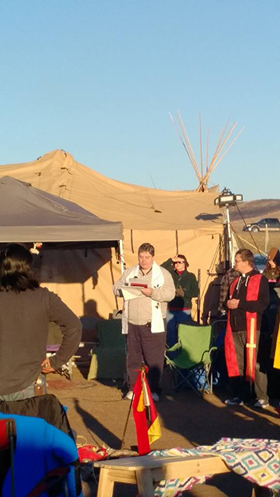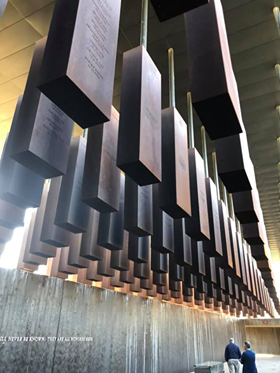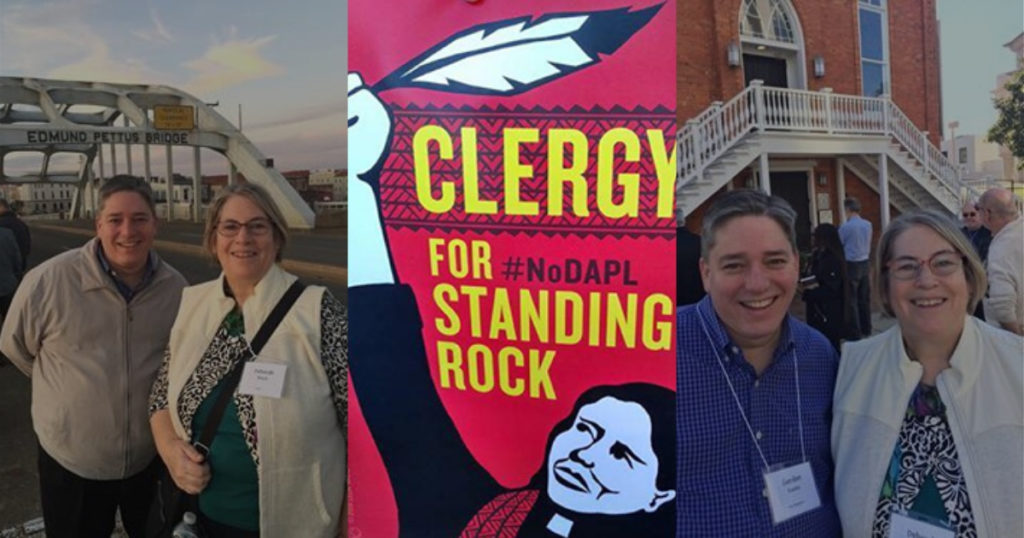Commentary: Being Always Angry
 The Rev. Gordon Rankin, New Hampshire Conference Minister, has been working on this reflection for several weeks, based on his trip to sacred sites in Alabama with the Council of Conference Ministers and his ministry at Standing Rock as the former South Dakota Conference Minister. He shares it now as we remember the legacy of the Rev. Martin Luther King, Jr.
The Rev. Gordon Rankin, New Hampshire Conference Minister, has been working on this reflection for several weeks, based on his trip to sacred sites in Alabama with the Council of Conference Ministers and his ministry at Standing Rock as the former South Dakota Conference Minister. He shares it now as we remember the legacy of the Rev. Martin Luther King, Jr.
There is a piece of dialogue in the original Avengers movie that long perplexed me. During the movie there is an ongoing wonderment about how Bruce Banner had learned to manage his anger and not uncontrollably turn into the raging Hulk. During the Battle of New York, the Avengers need the might of the Hulk and urge Banner to transform. In response, Banner says, “You want to know my secret? I am always angry.”
For a long time, the idea of being “always angry” made no sense to me. If I am totally honest, I am not one who does anger a lot. Sure, I can get frustrated or upset. But as far as having that anger that just sits in your gut and churns, that’s not me. Or at least it wasn’t.
It was my time working with our Lakota siblings that taught me the gift of anger. As I mourned with the Lakota community in remembrance of the several hundred men, women and children who were slaughtered by the first automatic rifles at Wounded Knee for dancing, my anger would stir. (By the way, the United States gave out more Medals of Honor for Wounded Knee than any other single battle in history.) As I learned about the impact of the Doctrine of Discovery (a church decree in support of colonization that later became United States law) and how our government has never in its history honored a treaty made with the Lakota people, my anger grew. As I stood with Water Protectors at Standing Rock clearly seeing the snipers that the militarized police had in place on the hills around us, it became clear that the Doctrine of Discovery has a profound impact today and is not just a story from history. Anger became real to me in a new way.
It is always clear to me that my Lakota friends carried this sense of anger around with them all the time. And why wouldn’t they? They have been slaughtered, dehumanized, lied to, betrayed, and relegated to some of the most inhospitable land there is. This happened not just throughout history but even during their lifetimes. How can there be a more appropriate response than anger?
I learned from my Lakota siblings that if I was to truly walk with them, to fully share human connection, to be an ally, that I needed to accept that the anger I felt would always be with me. And it is.
 In November, I joined many of my Conference Minister colleagues in visiting Montgomery, Birmingham and Selma, Alabama. I found my anger there as well. I was a college history major. I knew all the stories. But I hadn’t connected with the anger before. I’d like to be able to say this was because I was trained to be historically analytical. But I know in the depth of my soul that the truth is that I was protected from such feelings by my whiteness. Yet during this journey with trusted colleagues, there were these pieces of what we experienced that pierced my protections.
In November, I joined many of my Conference Minister colleagues in visiting Montgomery, Birmingham and Selma, Alabama. I found my anger there as well. I was a college history major. I knew all the stories. But I hadn’t connected with the anger before. I’d like to be able to say this was because I was trained to be historically analytical. But I know in the depth of my soul that the truth is that I was protected from such feelings by my whiteness. Yet during this journey with trusted colleagues, there were these pieces of what we experienced that pierced my protections.
I knew the stories of lynchings. I would have told you with conviction that such acts were reprehensible. But there was something about learning that lynchings were such public festivals that people would take photos to make them into postcards that pierced through and made me angry. During our visit to the National Memorial for Peace and Justice, reading all the names of people who had been lynched broke my heart. But it wasn’t until I read the names of those who were lynched in the county where I went to college that I really connected with my anger. I knew quite well of the bombing of the 16th Street Baptist Church, but it was the small detail that the four girls who were killed were in the bathroom getting ready to lead a Youth Sunday worship service that freed my anger for good. Since my return from Alabama, I find myself always angry.
In our conversations about racism, too often reconciliation gets defined as working towards forgiving and moving on. Let me be clear: that’s a fable of white privilege. Anger is the appropriate response to the destructive evil of racism. Privilege encourages us to ignore this truth. But faith, I have come to believe, asks us to join our siblings of color in their anger.
 I now know the experience of being always angry. And I think it has made me a more faithful person.
I now know the experience of being always angry. And I think it has made me a more faithful person.
The Rev. Gordon Rankin, New Hampshire Conference Minister, chairs the United Church of Christ Council of Conference Ministers.
Related News
A Prophetic Call for Justice and Peace in Palestine
The executive leaders of the United Church of Christ have issued the following statement...
Read More‘Love is Greater Than Fear’: Regional Youth Events get to the heart of gospel message
United Church of Christ teens attending this summer’s Regional Youth Events (RYE) are...
Read MoreUCC desk calendars available to order now
Prepare for your day, month and year with the United Church of Christ desk calendar —...
Read More


